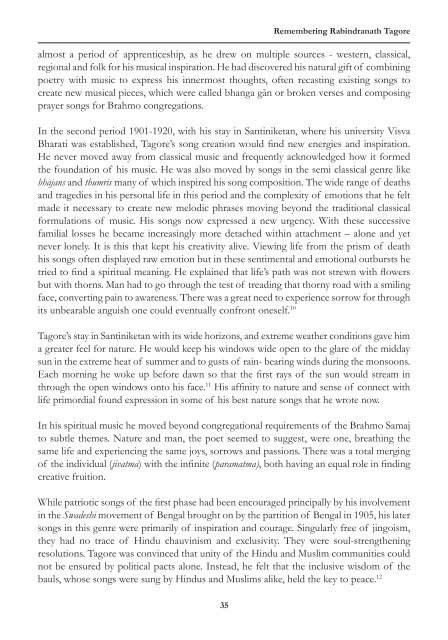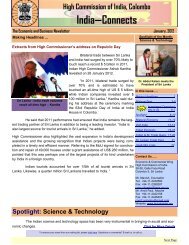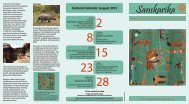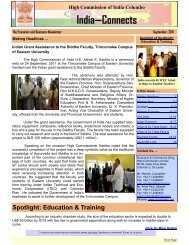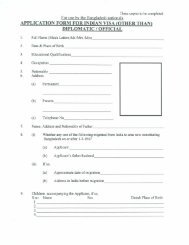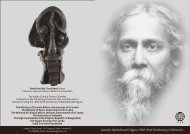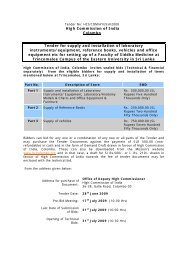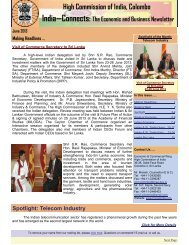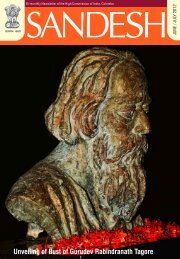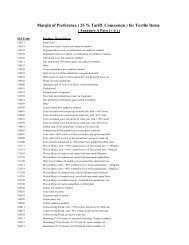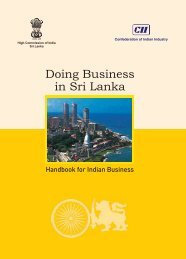Remembering Rabindranath Tagore Volume - High Commission of ...
Remembering Rabindranath Tagore Volume - High Commission of ...
Remembering Rabindranath Tagore Volume - High Commission of ...
Create successful ePaper yourself
Turn your PDF publications into a flip-book with our unique Google optimized e-Paper software.
35<br />
<strong>Remembering</strong> <strong>Rabindranath</strong> <strong>Tagore</strong><br />
almost a period <strong>of</strong> apprenticeship, as he drew on multiple sources - western, classical,<br />
regional and folk for his musical inspiration. He had discovered his natural gift <strong>of</strong> combining<br />
poetry with music to express his innermost thoughts, <strong>of</strong>ten recasting existing songs to<br />
create new musical pieces, which were called bhanga gān or broken verses and composing<br />
prayer songs for Brahmo congregations.<br />
In the second period 1901-1920, with his stay in Santiniketan, where his university Visva<br />
Bharati was established, <strong>Tagore</strong>’s song creation would find new energies and inspiration.<br />
He never moved away from classical music and frequently acknowledged how it formed<br />
the foundation <strong>of</strong> his music. He was also moved by songs in the semi classical genre like<br />
bhajans and thumris many <strong>of</strong> which inspired his song composition. The wide range <strong>of</strong> deaths<br />
and tragedies in his personal life in this period and the complexity <strong>of</strong> emotions that he felt<br />
made it necessary to create new melodic phrases moving beyond the traditional classical<br />
formulations <strong>of</strong> music. His songs now expressed a new urgency. With these successive<br />
familial losses he became increasingly more detached within attachment – alone and yet<br />
never lonely. It is this that kept his creativity alive. Viewing life from the prism <strong>of</strong> death<br />
his songs <strong>of</strong>ten displayed raw emotion but in these sentimental and emotional outbursts he<br />
tried to find a spiritual meaning. He explained that life’s path was not strewn with flowers<br />
but with thorns. Man had to go through the test <strong>of</strong> treading that thorny road with a smiling<br />
face, converting pain to awareness. There was a great need to experience sorrow for through<br />
its unbearable anguish one could eventually confront oneself. 10<br />
<strong>Tagore</strong>’s stay in Santiniketan with its wide horizons, and extreme weather conditions gave him<br />
a greater feel for nature. He would keep his windows wide open to the glare <strong>of</strong> the midday<br />
sun in the extreme heat <strong>of</strong> summer and to gusts <strong>of</strong> rain- bearing winds during the monsoons.<br />
Each morning he woke up before dawn so that the first rays <strong>of</strong> the sun would stream in<br />
through the open windows onto his face. 11 His affinity to nature and sense <strong>of</strong> connect with<br />
life primordial found expression in some <strong>of</strong> his best nature songs that he wrote now.<br />
In his spiritual music he moved beyond congregational requirements <strong>of</strong> the Brahmo Samaj<br />
to subtle themes. Nature and man, the poet seemed to suggest, were one, breathing the<br />
same life and experiencing the same joys, sorrows and passions. There was a total merging<br />
<strong>of</strong> the individual (jivatma) with the infinite (paramatma), both having an equal role in finding<br />
creative fruition.<br />
While patriotic songs <strong>of</strong> the first phase had been encouraged principally by his involvement<br />
in the Swadeshi movement <strong>of</strong> Bengal brought on by the partition <strong>of</strong> Bengal in 1905, his later<br />
songs in this genre were primarily <strong>of</strong> inspiration and courage. Singularly free <strong>of</strong> jingoism,<br />
they had no trace <strong>of</strong> Hindu chauvinism and exclusivity. They were soul-strengthening<br />
resolutions. <strong>Tagore</strong> was convinced that unity <strong>of</strong> the Hindu and Muslim communities could<br />
not be ensured by political pacts alone. Instead, he felt that the inclusive wisdom <strong>of</strong> the<br />
bauls, whose songs were sung by Hindus and Muslims alike, held the key to peace. 12


